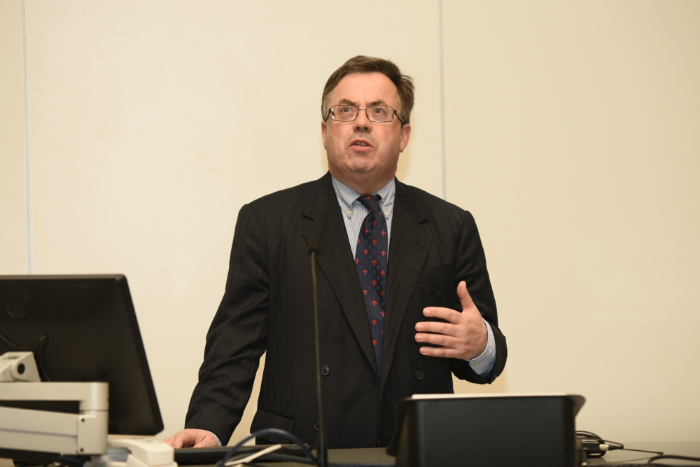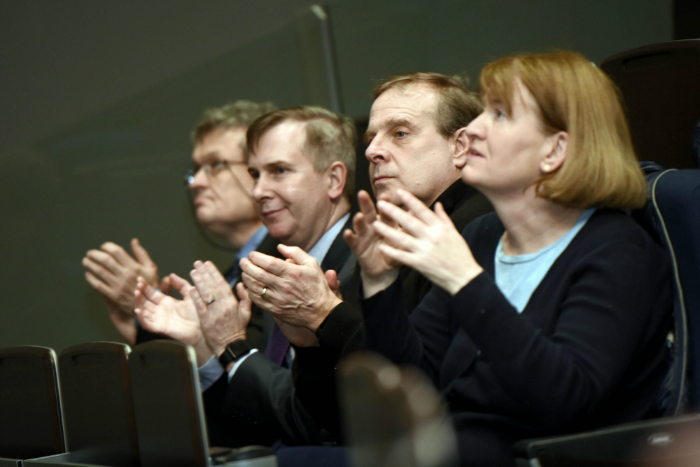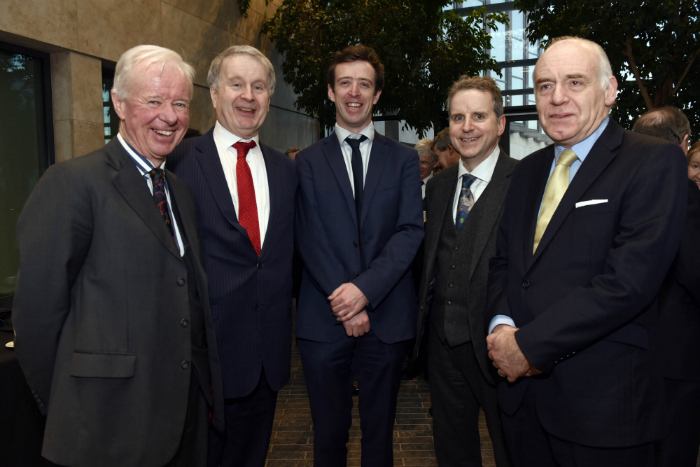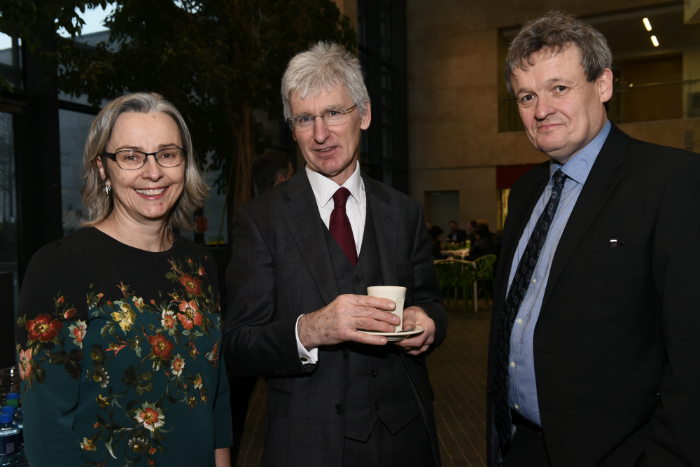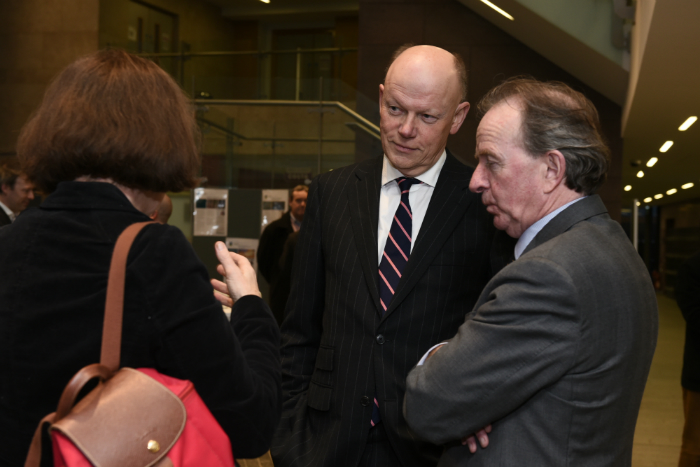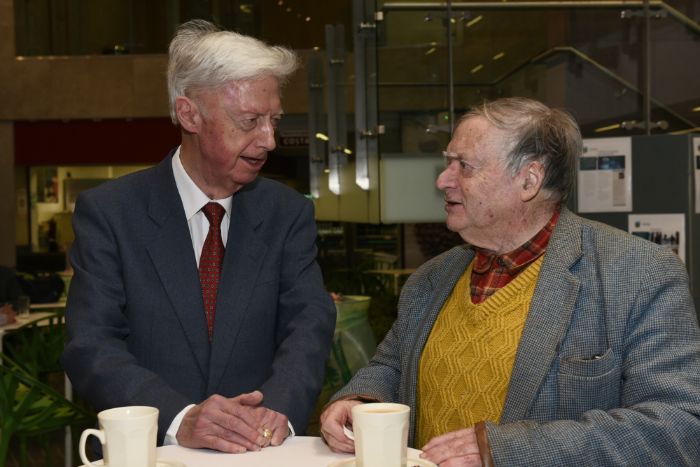Kelly Lecture 2018
News
- Conference for Early Career Academics on ‘Interdisciplinarity and Law’
- UCD Law Students win Cape Town Convention Moot Competition
- New Partnership announced with Matheson
- UCD scholarship honours late Declan McCourt
- UCD Environmental Law Field Trip to Brussels
- Taoiseach Micheál Martin launches Dr Niamh Howlin’s book marking the 50th Anniversary of the Offfice of the DPP
- Book Launch: Bridging the Gender Pay Gap through Transparency
- John M Kelly lecture 2025 delivered by Professor Kim Scheppele of Princeton
- Guest lecture by Mr Michael McGrath
- Professor Ian O'Donnell wins another book award!
- Ulysses Medal Awarded to Síofra O'Leary
- Professor Cathryn Costello and Dr Maebh Harding awarded ERC Consolidator Grants
- 'Soirée du Droit' hosted in UCD Sutherland School of Law
- Dr Niamh Howlin Book Launch in the Supreme Court
- Milestone Reunion of the Classes of 1984, 1994, 2004, and 2014
- John O'Donnell honoured with UCD Law Alumni Award 2024
- Mr. Declan McCourt RIP
- UCD Sutherland Opportunity Bursary
- Law Micro-credentials
- Special celebrations for the John M Kelly Lecture 2024 marking ten years in Sutherland School of Law
- ‘Digital Markets and the Law’: Workshop on emerging issues for businesses
- The James C Brady Prize Award winning students for 2022/2023
- Matheson Diversity in Law Newman Fellow appointed at UCD Sutherland School of Law
- Guide for 2024 Referendums on Family and Care
- Professor Aisling Swaine joins UCD Sutherland School of Law from UCD School of Social Policy, Social Work and Social Justice
- Aedamar Comiskey is honoured as Law Alumni Award Winner 2023
- The Bank of Ireland Finance Student Awards November 2023
- Milestone Reunion of the Classes of 1983, 1993, 2003 and 2013
- The new Individual Accountability Framework in Financial Services Ireland
- Leading scholar of EU Law and Labour Law appointed Full Professor at UCD Sutherland School of Law
- Court of Appeal Workshop
- Four Adjunct Professors Appointed to UCD Sutherland School of Law
- Launch of Barristers in Ireland: An Evolving Profession Since 1921 by Dr Niamh Howlin
- UCD SUTHERLAND OPPORTUNITY supported by MASON HAYES & CURRAN LLP BURSARIES
- Professor Ian O'Donnell wins US Criminology Book Award
- Four UCD Law students take part in Our Rule of Law Academy in Brussels
- International Conference on Education and Democratic Citizenship (ICEDC) hosted in Sutherland School of Law
- International Symposium “Entrenching a Global Health Emergency Mode: Implications for Health and Human Rights Law”
- John M. Kelly lecture 2023 delivered by Baroness Onora O’Neill
- The 1981 BCL Class celebrate forty years since graduation
- Minister Roderic O’Connor chairs panel at seminar hosted by UCD Centre for Constitutional Studies
- Leading scholar of international refugee and migration law appointed Full Professor at UCD Sutherland School of Law
- Caoilfhionn Gallagher KC appointed Adjunct Full Professor at UCD Sutherland School of Law
- Copy of Donnybrook Magdalene Laundry Book Presented to the President of Ireland
- UCD team wins the 2023 Corn Adomnáin – International Humanitarian Law Competition
- UCD Sutherland Opportunity supported by Mason Hayes & Curran BURSARIES
- HRER/ UCD Conference 12 June 2023: preliminary announcement and Call for Papers (deadline 13.03.23)
- Professor Gráinne de Búrca awarded UCD Honorary Degree of Doctor of Laws
- Further Learning in Employment Law
- UCD Law Team wins the National Moot Court Competition 2022
- Dr Michael F Farrell, human rights activist awarded Honorary Degree of Doctor of Laws
- UCD Law alumna, Judge Síofra O’Leary, appointed president of European Court of Human Rights
- Large numbers of Alumni attend the 2022 Milestone Reunion
- Portrait of Mrs Justice Catherine McGuinness
- Dr Lukasz Grzejdziak appointed to EU Project for sustainable reforms in Ukraine's justice sector
- Mr Justice Gerard Hogan launches ‘Palles: The Legal Legacy of the Last Lord Chief Baron
- Conferring of UCD Matheson PhD Scholar in Commercial Law
- UCD PhD Student Awarded Irish Research Council Funding
- Professor Laurent Pech appointed Dean at UCD Sutherland School of Law
- Magdalene Laundries: Told, Acknowledged and Not Forgotten
- Professor John D Feerick conferred with honorary Degree of Doctor of Law
- 2022 Matheson | UCD Leadership Series Crypto and the Digital Assets Revolution: What’s Next?
- Histories of Probation in Ireland: A Theoretical Analysis
- Three Upcoming Constitutional Law Conferences in UCD Sutherland School of Law
- Lord Hendy focuses on P&O Ferries for the 2022 Guest Lecture in Employment Law
- Lord Sumption delivers the 2022 John M. Kelly lecture to a large audience in UCD Sutherland School of Law
- Chief Justice Launches UCD Student Legal Services Journal 2022
- The Rt. Hon the Lord Mayor of the City of London, Alderman Vincent Keaveny visits UCD Sutherland School of Law
- UCD Law hosts Student Event on The European Strategic Autonomy with Admiral Mellett (ret.) and Colonel Dirou
- UCD Law Students Refugee Law Mooting Success
- Major Conference on Philanthropy hosted by UCD Sutherland School of Law
- Fourteen Law Students Awarded Medals at Bank of Ireland Prize Giving
- Professor Imelda Maher appointed Fellow at New York University
- 2022 Helga Pedersen Moot Court Competition
- Ad Astra Fellows, UCD Sutherland School of Law
- Sutherland Fellow in French Law 2021/22
- Legal History Research Group publishes new book
- Mentors Sought for UCD Law Students
- Alumnus Vincent Keaveny appointed Lord Mayor of the City of London
- Three Doctoral candidates awarded Irish Research Council Scholarships
- European Traineeship in Intellectual Property
- THE Rankings position UCD Sutherland School of Law as Ireland’s leading University Law School
- The Class of 2022
- News 2021
- News 2020
- News 2019
- Bashir Otukoya at EGSL Rotterdam
- Dr. Paul Anthony McDermott SC. RIP
- Colin Ryan BCL 1997 receives Alumni Award in Law
- Campus Engage – Spotlight on Student Volunteering
- Democracy in the European Union – getting it right
- Grace Oladipo and Hannah Garvey win Arthur Cox Awards
- Dr Franck Gloglo appointed McCann FitzGerald Assistant Professor in Law and Business
- Irish Women Lawyers Association Competition Winner
- Prof Imelda Maher and Prof Gavin Barrett books launched at MoLI
- McCann FitzGerald Negotiation Competition
- Medals for Top Students at 43rd Bank of Ireland Awards
- Reunion of 1979,1989, 1999 & 2009 Classes
- Chief Justice delivers Walsh Lecture 2019
- Exploring Direct Provision
- Matheson and UCD Conference: Culture and Governance in Financial Services
- Former Labour Court Chair, Kevin Duffy, receives Honorary Doctorate
- Comórtas Óráide 2019
- School of Law hosts a major meeting of the European Law Institute
- Dr Liam Thornton before Oireachtas Committee
- PhD students from around the world attend 2019 Atlas Agora in UCD
- Professor Stephen Calkins to receive American Antitrust Institute Achievement Award
- Peter Sutherland Memorial Day
- UCD Centre for Constitutional Studies Public Law Conference 2019
- UCD Ad Astra Fellows
- London Study Trip sees law students visit top law firms and 'the Old Bailey'
- "Managing Partners' Award" for partnership with A&L Goodbody
- News 2018
- Law Review Volume 18 Launch
- Irish Association of Law Teachers Spring Discourse
- Oversight of Public Sector Workshop
- Donald Tusk Receives Lawsoc Membership
- Prof O'Donnell Meets President Higgins
- Brussels Alumni Event 2018
- Pardon for Myles Joyce
- Environmental Law Book Launch
- Croi Art Installation
- 21st Irish European Law Forum conference
- DPO Forum
- Thomas Addis Emmet Fellowship
- Kelly Lecture 2018
- Dean of Law speaks about her passion for teaching
- Dr Mark Coen receives Charlemont Award
- Third Sector Research meeting in UCD
- North-South Graduate Scholarships
- UCD Law Alumna appointed to White House role
- Student Profile: Weronika Nowak
- Law Faculty in Australia
- UCD students win individual and team prizes at Irish Times Debate
- Legal History Book Launch
- Robert Lee wins Law Ireland competition
- HIIG Fellowship
- Peter Sutherland RIP
- 42nd Annual Bank of Ireland Student Awards
- Professor Imelda Maher presents Vincent Keaveny with the Law Alumnus of the Year Award
- Professional Diploma in Professional Regulation
- Matheson UCD AgriFood Conference
- Alumni Reunion 2018
- UCD Research Impact Case Study Competition
- Impact case study award for TJ McIntyre
- Prof Imelda Maher Book Launch
- McCann FitzGerald Assistant Professor
- 2018 Law Alumni Award in Law
- Welcome Barbeque for incoming First Years
- 2018 VV Giri Lecture
- Major Criminology Conference in Sutherland School of Law
- IELF European Nature Law
- World Cup Hockey
- Leman Award 2018
- Judicial Review Conference 2018
- UCD Law with History graduate awarded Dean’s Scholar Prize at Harvard Law School
- Society of Legal Scholars Annual Seminar 2019 to be held in UCD
- Edoardo Celeste at the Hans-Bredow-Institut of Hamburg
- UCD BCL Student on her Clinical Legal Education placement with FLAC
- Legal History Group Conference on Law and Religion in Ireland 1530-1970
- UCD BCL student wins Dr Mary Redmond Bursary
- Professor Imelda Maher at the Luke Wadding Lecture Series
- Semi-Finalists in the Oxford French Law Moot
- Elisa Palagi (1962-2018)
- Launch of the UCD SLS Law Journal 2019
- UCD EU Field Trip to Brussels 2019
- The John M.Kelly Memorial Lecture 2019
- News 2018
- News 2017
- News 2016
John M. Kelly Lecture 2018 Delivered by Prof Gerry Whyte
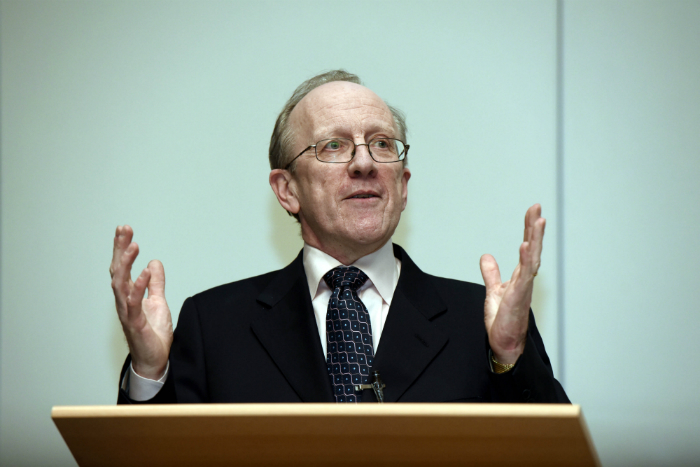
Pictured above: Prof Herry Whyte delivers the 2018 John M. Kelly Lecture
The Kelly Lecture 2018 was delivered by Prof. Gerry Whyte of Trinity Law School, this year titled “On Lord Ellenborough’s Law of Humanity”. The author or co-author of books on public interest law, constitutional law and trade union law, Prof Whyte has published extensively in the areas of public interest law, constitutional law, social welfare law and labour law. He has also collaborated for many years with a variety of social justice and legal aid organisations, was a former member of the Commission on Assisted Human Reproduction and of the Steering Group of the Irish Council of People with Disabilities and is a current member of the Legal Services Regulatory Authority. Together with Mr. Justice Gerard Hogan, he has edited the third and fourth editions of J.M. Kelly: The Irish Constitution. We were pleased to have been joined by The Hon. Mr Gerard Hogan who delivered the introduction this year. Both Prof Whyte and Mr. Justice Hogan are UCD Alumni.
Prof Whyte posed challenging questions relating to the protection of socio-economic rights in the Irish legal system. Taking its cure from R v Inhabitants of Eastbourne (1803) 4 East 103, Prof Whyte questioned whether there is a ‘law of humanity’ which the Irish legal system, whereby socio-economic rights are respected, protected and/or fulfilled. In an engaging address, Prof Whyte noted the re-birth of the law of humanity throughout the 1990s in the United Kingdom. Several judgments sought to use this principle as one of the basis for preventing the absolute destitution of asylum seekers within the UK. Moving onto Irish law, Prof Whyte noted the conservatism of Irish judges overall on recognition of socio-economic rights. Prof. Whyte argued that the constitutional objective of the dignity of the individual could provide a more fruitful arena for judicial dialogue that hitherto has been the case. The freedom to work for asylum seekers and access to criminal legal aid had seen a more restrained (and indirect) invocation of the law of humanity. Prof Whyte noted how the German courts have used their constitutional concept of dignity to further enhance and protect persons at the margins of society. Prof Whyte argued that the concept of dignity within the Irish constitution can only be understood by reference to Catholic Social Thought and the religious references that are still present in the Irish constitution. Acknowledging that this argument may not be popular, Prof Whyte insisted that the Christian and democratic nature of the State can be used by judges in enhancing and respecting the law of humanity in the arena of socio-economic rights.
This lecture series is named for John M. Kelly (1931-1991), Professor of Roman Law and Jurisprudence in UCD 1965-1991. Author of several books including the definitive The Irish Constitution and editor of the Irish Jurist, Professor Kelly also served as Senator,TD, Chief Whip, Attorney General, Minister for Foreign Affairs and Minister for Trade and Tourism. His last book, A Short History of Western Legal Theory was published by Oxford University Press in 1992.
Pictured below: The Hon. Mr Justice Gerard Hogan introduces the Kelly Lecture 2018
